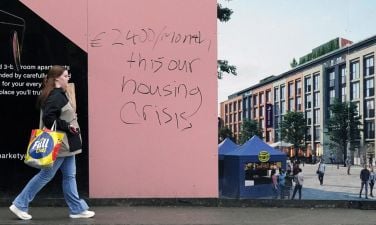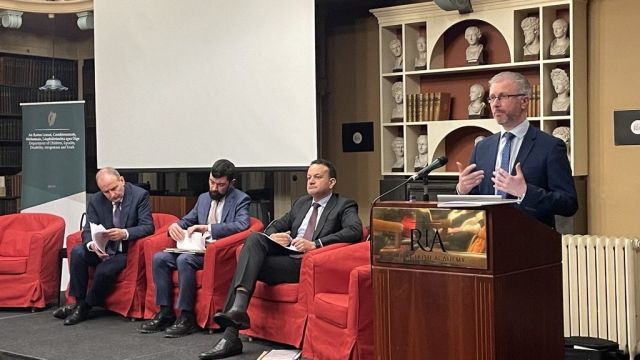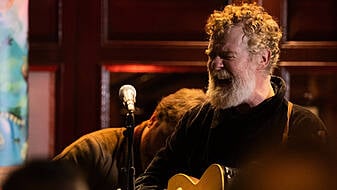Implementing an action plan to eliminate racism in Ireland “in all its forms” will not be an easy task, the Equality and Integration Minister has said.
The comments were made by Roderic O’Gorman at the launch of the National Action Plan Against Racism 2023-2027, the first of its kind compiled since 2008.
He was accompanied by Taoiseach Leo Varadkar, Tanaiste and Foreign Affairs Minister Micheal Martin, and Minister of State Joe O’Brien.
Mr Varadkar acknowledged at the event that racial profiling by members of An Garda Síochána happens “unintentionally”, and that it needs to change.
As part of the plan, a special rapporteur on racism and racial equality will be appointed to monitor the implementation of the plan, and one million euro is being allocated to anti-racism initiatives.
The report reflects Ireland’s aim for “zero tolerance” of anti-Semitism, Islamophobia, racism that impacts on Travellers and on those of different ethnicities, ministers said.
Mr O’Gorman said it was an “ambitious” plan of “real scope and substance”.
“The plan is intended to be a comprehensive and State-led coordinated approach to eliminating racism in all forms, in all parts of Ireland, and this includes eliminating racism in the form of antisemitism, Islamophobia, racism that impact on Travellers and racism impacting people of African descent,” he said.
“And the plan recognises the existence of systemic racism in Ireland and the need to tackle it and eradicate it.”
He added: “I sincerely hope that marginalised communities begin to feel the benefit of this plan, and continue to engage with us in terms of our ambition and our efforts to entirely eliminate racism.”
The National Action Plan Against Racism was compiled over two years by an independent anti-racism committee, chaired by Professor Emerita Caroline Fennell.
Speaking at the launch, Prof Fennell said the plan “sets out its vision of a fair, equal and inclusive society, where minority ethnic groups share full parity of esteem and respect, where everyone is able to enjoy their fundamental rights and freedoms and has equal opportunities in all aspects of life irrespective of their racial background”.
“It is our fervent hope that the plan will make Ireland a better society for all, where every person has the opportunity to reach their full potential and live a fulfilled life in safety and in health.”
Owen Ward, an Irish Traveller and a member of the committee, said he has extensive experience of racism in Ireland.
“I remember growing up in Ireland where there was little diversity across the population, with the majority being white settled Irish,” he told the event.
“Even then, I felt the burden of the negative impact from racism that affected our daily lives. However, Ireland is now a multi-ethnic and multi-cultural nation, and we must accept that Ireland has changed and embrace our future.
There is clear evidence that racism exists in Ireland and many of us feel its impact on our daily lives.
Salome Mbugua, a commissioner for Irish Human Rights and Equality and CEO of AkiDwA, the Migrant Women’s Network Ireland, said that in Ireland today “we still have people who have strong racist attitudes and deep-seated prejudices”.
“I am a victim of racism myself. Many migrant women face racism daily in public spaces, in public transport, in residential areas, in colleges, in hospitals, at work, and when trying to access support and services.
“Travellers continue to be treated very poorly in our Irish society, they can hardly access social places, cultural places, and I tell you this as a Human Rights Commissioner, I observe quite often when you’re having meetings, and I hear every time how we are representing them in the court, because they have been denied to access social spaces. This must stop.”
Speaking to reporters after the event, Mr Varadkar acknowledged that racial profiling by members of An Garda Síochána needs to change.
He said: “I think it probably does happen unintentionally and its not right.
“I think it should change and it has to change because assumptions should not be made about people based on their appearance. What I hear of anecdotally and I don’t have enough evidence to support this, but assumptions can be made about somebody’s appearance that maybe their documents should be checked or their passport should be checked when you mightn’t do so with a person who looks more traditionally Irish, if that makes sense.
“A lot of racism isn’t malicious, it’s just that people aren’t clued in and don’t understand these things.”
Members of the youth group Foroige – of Irish-Iranian, Roma and Black African backgrounds who had experienced forms of racism in Ireland – addressed the crowd about their involvement in the report.

A young Irish-Romani read a poem to the audience about her experience of having a dual-identity, and spoke to Mr Martin after her performance.
Mr O’Brien said that it was an honour to be involved in the launch of the report, and said his first question in the Dáil was to ask for an update on work to develop the action plan.
Mr O’Brien warned against “simplifying” racism by saying that it is only perpetrated by racists, and said that the instructional arrangements and cultural norms that discriminate against people based on ethnicity should also be acknowledged.







